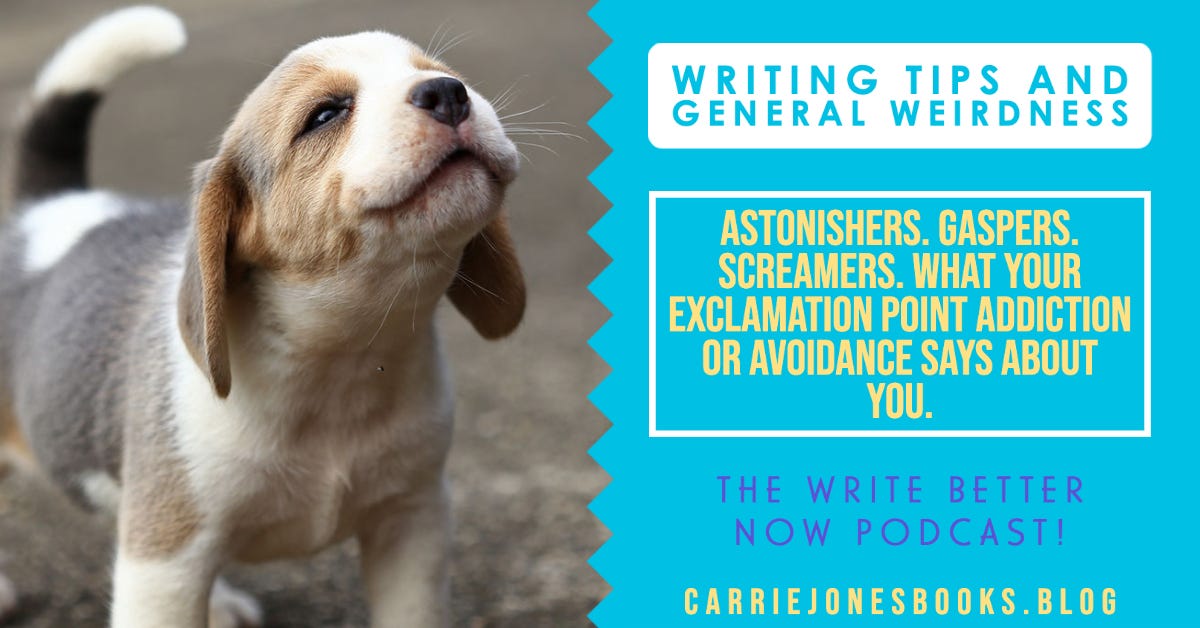Astonishers. Gaspers. Screamers. What your exclamation point addiction or avoidance says about you.
Write Better Now, the podcast episod
Hi, welcome to Write Better Now, a podcast of quick, weekly writing tips meant to help you become a better writer. We’re your hosts with NYT bestselling author Carrie Jones and copyeditor extraordinaire Shaun Farrar. Thank you for joining us.
Lately, I’ve been working with a lot of writers who are sending in their stories and they seem to have a great fear of the mighty exclamation point.
And I get it. I get their concerns, the exclamation point has a pretty bad rap. We’ve all seen stories where every bit of dialogue ends in an exclamation point. Or our boss sends us an email and everything is a sentence fragment ending with that exclamation point.
The BBC even has an article about what overusing the exclamation point says about you, writing:
“Bill Bryson – writes, the exclamation mark is classically used ‘to show strong emotion (“Get out!”) or urgency (“Help me!”).’ If part of the point of punctuation is to change the timbre of the voice – another part is to get you out of a hole. Punctuation saves lives: there’s a meaningful difference between ‘Duck’ and ‘Duck!’ Both of Bryson’s examples are notable for the underlying sense of emergency, need for security, and atmosphere of fear. No wonder, then, that newspapers have historically referred to exclamation marks as ‘astonishers’, ‘gaspers’ and ‘screamers’; no wonder newspapers have been their most voracious advocates.”
They consider it the selfie of the internet. I think it’s sort of the selfie of the punctuation club, too. It’s like “Yo. Exclamation mark is in the house. Everyone give it some attention!”
And the BBC article goes on to say,
“Overuse of any punctuation mark tells us something about ourselves, in the same way overuse of any object does. How you punctuate your sentences might have something to do with how you punctuate your life.”
Here’s the thing: the exclamation point is not your enemy and it’s okay to use it in moderation.
Even the god-like purveyor of all things grammatical in U.S. novels, the Chicago Manual of Style says that the exclamation point can be used, just do it sparingly or it loses its effectiveness.
This is really true about everything from em-dashes to semicolons to the sexy and addictive ellipses….
Cough. See what I did there?
When you avoid the exclamation point in dialogue obsessively, it isn’t helpful and you end up with something like
She shouted, “I can’t believe you.”
Or
He yelled, “I’m going to kill you, so you betta run.”
Or
They hollered, “Help me.”
It looks dumb. The reader thinks, “Um, are they really shouting if there is no exclamation point?”
As the writer, you want to be in control of your world and part of that control is making sure that you don’t give the reader conflicting signals through verb and punctuation because a conflicted reader is a reader who won’t keep reading, who won’t keep trusting you the writer to take them on a journey into another world.
So, if you make someone shout or yell or holler in dialogue, really make them do it. Pretend they are a politician making a tweet or someone being ironic and throw them all in there. No, just kidding. Only use one at a time.
Seriously!
Hey, thanks for listening to Write Better Now.
These podcasts and more writing tips are at Carrie’s website, carriejonesbooks.blog. There’s also a donation button there. Even a dollar inspires a happy dance in us, so thank you for your support.
Subscribe: Amazon | Anchor | Apple Podcasts | Google Play | RSS | Spotify | Stitcher | YouTube




